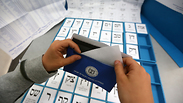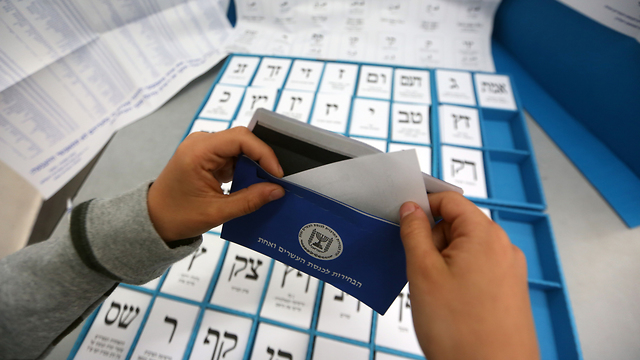
Record number of 'wasted votes'
Some 325,000 ballots might be essentially useless if the count of over 200,000 double envelopes - which are counted last - proves fruitless for parties failing to pass the electoral threshold; Bennett's New Right party appears to be the only one with a chance to enter Knesset
The vote - following the general elections held across the country on Tuesday - appears to be split with Prime Minister Benjamin Netanyahu's Likud and the Blue and White Party lead by Benny Gantz receiving 35 seats each. The prime minister, however, secured a path to reelection by having a clear right-wing majority in the Knesset.
Although the count of what is collectively known in Israeli elections as “double envelopes” - which are counted last - is expected to continue until late Thursday, the possibility of those ballots making a significant difference is questionable. The double envelopes - which include soldiers, prisoners, hospital patients and Israeli diplomats abroad - amount to approximately 200,000 ballots.
The latest results indicate that Naftali Bennett and Ayelet Shaked’s the New Right party has received some 127,000 votes, putting them some 4,300 votes (and 0.11%) below the 3.25% threshold and making them the only party with a chance to still enter the 21st Knesset.
In the meantime, Moshe Feiglin’s Zehut received at least 101,000 votes and Orly Levi-Abekasis' Gesher party more over 70,000.
A whole list of smaller political parties - each failing to gain more than 5,000 votes - also added to the overall number of ballots considered wasted. A party founded by the internet celebrity Semion Grafman received at least 4,352 votes. The Arab list headed by Muhammad Kanaan won 4,083. Former IDF Brigadier General Gal Hirsch’s Magen party received just over 3,000 votes, Oren Hazan’s Tzomet party got at least 2,300 votes, while the party of Israeli pensioners received between 1,000 and 1,500 of votes.
This would mean that at least 325,000 ballots were cast for parties which failed to pass the electoral threshold, rendering those votes useless.
That number would increase even further if after the double envelopes are counted the Arab party list Raam-Balad - which received some 140,000 votes - will also fail to enter the Knesset. If the Arab parties had formed an alliance list, similarly to the 2015 elections, they are estimated to have gotten at least 11 parliament seats.
In addition, there were at least 16 registered parties that received a three-digit number of votes, hovering somewhere between 244 and 194 ballots each.
In 2013, when the electoral threshold stood at 2%, the number of votes cast for parties which failed to make it to the Knesset stood at 266,205, with some 43,734 votes going to the Green Leaf party, known for its ideology of legalizing cannabis.













